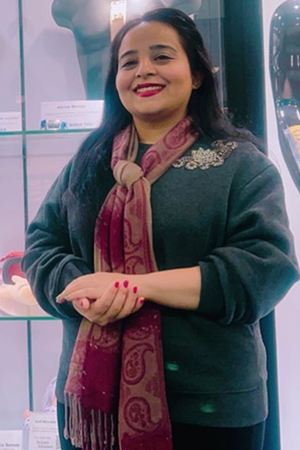March 26, 2024
By Chloe Arrington
The George W. Woodruff School of Mechanical Engineering is celebrating Women’s History Month by shining a light on some of the women in our community. March has been recognized as Women’s History Month around the world for over three decades. It serves to highlight and celebrate the achievements of and continue the fight for equality for women in every field.
Graduate student Maria Sattar talks about her experience as a woman studying mechanical engineering, what she has learned, and what she hopes to pass on and inspire in others.
Introduce yourself! Where are you from and what drew you to Georgia Tech?
Hi, I am Maria Sattar. I am a Fulbright Ph.D. scholar from Pakistan. My hometown is Multan, Punjab. I am in the fourth year of my program and a part of Associate Professor and Woodruff Faculty Fellow W. Hong Yeo's Bio-Interfaced Translational Nanoengineering Group. My research focus is on self-sustainable wearables for human health monitoring.
When I was selecting my university, I knew I wanted to be part of a vibrant and multicultural community. Georgia Tech is the best university with such a diverse educational and research community. The Institute is also focused on women empowerment.
Did you always plan to study in the STEM field? Where do you hope your mechanical engineering studies take you?
Both of my parents are science teachers, so I was born into an atmosphere where everyone talked about science, especially physics, math, and biology. My interest in STEM developed in my childhood when I used to play with my elder siblings’ science projects. They made me curious as to how things worked and how they were made.
I was a practical, curious, and adventurous child, and I wanted to be either a doctor or an engineer to apply what I learned. Fortunately, I became a multidisciplinary engineer which gives me the platform to solve challenging problems. Mechanical engineering studies are quite challenging and provide me the opportunity to build my leadership strengths and more. I hope my mechanical engineering studies will help me build platforms for other women so that they can confidently pursue their dreams and become whatever they want to be without the fear of being judged or discriminated against.
Who are some women of history, and present day, that are inspirations to you?
Ruth Bader Ginsburg, Marie Curie, and Fatima al-Fihri are quite distinguished women of history, and my inspirations. These three women are all beautiful minds who served beyond their capabilities to build a prosperous world. Their courage, determination, and passion motivate me to be a good woman. In addition, presently, Malala Yousafzai and Muniba Mazari are Pakistani women who have suffered a lot and are still fighting for women empowerment.
Is there a woman that history forgot who you would encourage people to learn about?
I would encourage people to learn about a few women such as Fatima al-Fihri, Marie Curie, and Mileva Marić. It would be great if people learned about the contributions of these women to today's science. Despite the challenge of being women in STEM, they have become astonishing examples of women empowerment. They marked in history that women played a crucial and mandatory role in building today's scientific world. For example, Fatima al-Fihri used all her assets to build the world’s first ever higher education university when her father, husband, and brother passed away. She fought societal norms, broke barriers of single women, and made history to foster science for future generations.
What would you tell younger women who want to study STEM, and is it the same thing you wish someone had told you?
My mother told me to realize my self-worth, I matter, and I do not need anyone's confirmation. She taught me to be myself and pursue my passion in STEM, and that I can pave a path for the ones who will come after me. I would tell young women wishing to pursue STEM the same thing.
How would you suggest male students amplify and encourage female students in the classroom?
Male students are a dominant part of the classroom. I would suggest male students encourage their female classmates to take part in discussions, decision making, and try to help modify their leadership skills. Become good classmates – give women the courage to speak and share their thoughts without any fear.

